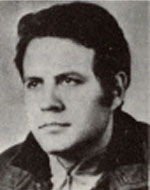Samuel (Sami), son of Rachel and Aaron, was born on 27.9.1942 in Mogador, Morocco. He was a few months old when he got ill and had to undergo several operations that endangered his life. The devoted care of the parents brought about his complete recovery and the handsome and cheerful baby was their heartbreak. From an early age he discovered artistic talents; He carved wood, paint, mold, and fissel, and his room was full of tools, which served him at leisure. At that time, the Moroccan government restricted the Jews’ steps and the Korkos family decided to immigrate to Israel. Sami was twelve years old when he completed his studies in the elementary school and was sent to Israel as part of the Youth Aliyah. He managed to celebrate his Bar Mitzvah, which preceded it, with his family. Sami arrived in Israel and was sent to the Nitzanim youth center, where he studied for three years. At the end of the three years, he joined his family, who in the meantime immigrated to Israel and settled in Be’er Sheva, and studied the framework profession. For him, the metal was a vivid material. He created and designed it, out of great love, and in every hour of leisure he continued his artistic pursuits with the dream of becoming an artist one day. Shmuel was drafted into the IDF in early 1960 and assigned to the Armored Corps, where he underwent the basic training course in the corps and was assigned as a gunman in the Sherman tank crew, and he was punished for his carvings and tables. He was hired to work at the Oron factory in the Negev and was one of the best and most outstanding workers in the factory, and he was never deterred from any work that was a challenge, even a great one, and his colleagues and managers did not forget how he climbed to the top of a six- , In the midst of storm winds during the winter, and performed a gentle welding work hanging After returning from the Six Day War in 1967, he was accepted to work at the Nuclear Research Center in the Negev, as head of a mechanical maintenance team, and graduated cum laude from a technician training course, and Sami was the living spirit among the factory workers. He was willing to volunteer for every difficult task and to perform it in the most efficient way, and he met his girlfriend Ninet, and the two married and established their home in Be’er Sheva, an exemplary father, devoted husband and loyal son. . Sami did not abandon his artistic hobbies and when he traveled on a tour of Europe, spent most of his time in museums, especially with the sculptures of his favorite artist – Rodin. The knowledge he acquired in his tour was to improve his work and develop it. Sami also studied the Jewish community in his hometown, Morocco, and surprised everyone with the deep knowledge he had acquired. His research was to be written as one of the most profound and comprehensive works in the study of this magnificent community. His kindness, his great honesty, his tremendous energy, his wide interest in every field and his deep sense of justice prompted him to recognize the social injustice he encountered in his daily life and he joined the Oded movement, which was established in Be’er Sheva. He was one of the movement’s mainstays and spokesmen and was to be its candidate in the municipal elections. When the Yom Kippur War broke out, Sami was called to his unit and served as a liaison with a tank crew that fought on the Sinai front. In this role he made the entire period of fierce battles of the war. His letters from the front are filled with optimism and humor, and in one of them he wrote: “After a difficult battle I had with opening a box of peas …” or “sitting calmly on the edge of the canal waiting for what will come.” On October 22, 1973, a cease-fire agreement was signed with the Egyptians. On October 23, 1973, Sami volunteered to take a tour of the Mitla axis instead of a friend who had fallen ill. The tanks were caught in heavy fire and an enemy missile hit the tankSammy and killed him. He was brought to rest in the cemetery in Be’er Sheva. He left behind a wife and two daughters, parents, six sisters and a brother. After his fall, he was promoted to sergeant. His sister-in-law Ilana wrote: “… Shmuel was a wonderful, dynamic and lively figure … if he needed to know that he could stand alone against many for the things he believed in … Promotion in the social and educational sphere was a lofty goal for him – for him and for all those who aspired But they did not have the means. “
